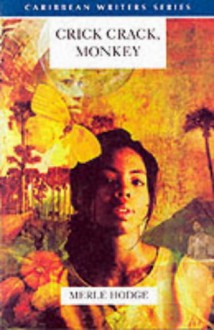
Thanks to the Borough Press (Harper Collins UK) and NetGalley for providing me an ARC copy of this novel that I freely chose to review.
This is a debut novel, and what a debut! Although I hadn’t heard of the author before, I was thrilled when I realised that we had a few things in common (I’ve also worked as a translator, and we’re both alumnae of Sussex University. Go Sussex!), and I am sure this will not be the last novel I read by Mackenzie.
This novel touches on many things, and although it does it with wit and humour (at times a very sharp and quite dark sense of humour), the themes it delves in are quite serious. Illegal immigrants (in this case, Venezuelans in Trinidad) that try to settle into their new life, but whose already uncertain and danger-ridden existence becomes more complicated when they are blackmailed into doing all kind of other illegal things to settle the debt a member of their family, Aunt Celia, left unpaid upon her sudden death. The Palacios, an extended but close family, with their traditions, their unique personalities, their traditions from home and from their adopted land, their parties and meals together, with their quirks and their not-quite-upstanding members, are suddenly thrown into the hands of the criminal underworld, and their lives become even more dangerous. There is blackmail, housing other illegal immigrants, being tracked and followed, having to work all hours to keep their non-paying guests, being threatened and pushed around, and some of their members are even driven out of their minds by the pressure. To all these events (and more that I’m keeping quiet), we have to add life as usual for this family, and that includes: secret love-children, a young girl’s pregnancy, dangerous love affairs, strong women (some with a flair for drama), weak-willed men, heavy drinking, unfaithful husbands, grief and mourning, mental illness, trying to fit into a completely different place and being the object of prejudice and suspicion. The author explains her reasons for choosing to write a comedy in her note at the end, and they make perfect sense to me. First, because, as she says, some people might resist reading another book that deals in some of these very serious topics if they are presented in a straightforward manner, but a comedy might reach those readers, and also, because comedy and humour are great weapons to deal with dark situations and to endure and keep hope alive when things are tough. The author does a great job, both in dealing with the illegal immigration angle, and also in creating a family that we love (or at times, love to hate).
There are many characters, some pretty major (not all the members of the family have important roles, but we do get to know them fairly well by the end of the novel, although there are plenty of surprises, and I’m not only talking about Aunt Milagros here), and others that only pass-by, like some of the illegal immigrants they are forced to house through the year, and in many cases they are depicted like a cartoonist would do, exaggerating some traits for comedic purposes, but affectionately. Yola, the main protagonist, who narrates the story in the first-person, is intelligent, witty, hard-working, and although she might not see eye-to-eye with all the members of her family, she loves them fiercely and would do anything for all of them, even for the new arrivals that she’s not so keen on. Aunt Celia, who has died just before the story starts, is also very present in the novel, as she had been writing her biography/memoir, and the manuscript is passed on to Yola, who is also a writer and translator, and whom the majority of the members of the family think of as the most suited to follow in Aunt Celia’s steps (and become the family’s official bitch). Celia’s book is priceless, and we get to hear her voice through Yola’s reading. Then we have Ugly, who although doesn’t turn up often, his few appearances are very memorable. And Román, the romantic hero (yes, I know, the name is self-explanatory), who at first appears more of an antihero, but there is more to him than his gorgeous looks, and, well, let’s say the romance side of the story is bound to satisfy most readers keen on the genre. I liked Yola, and although some of her actions seemed pretty unreasonable and inconsistent, she is fully aware of it. As we’re inside her head, it’s easy to empathise, especially because she’s put in pretty impossible situations at times, and it’s difficult to imagine what else she could do. I also liked most of the members of her family, and yes, Aunt Celia and Aunt Milagros truly shine through. The female characters are more memorable than the males (other than Román and Ugly), but they are also familiar, and it’s likely that most readers would identify people they know who share characteristics with them. As is the case in all families, you might have your favourites, but there’s so much history shared that you feel for them. Yes, I’ll miss the Palacios.
The writing is sharp, witty, and eminently quotable. It flows well and although I know many readers don’t like first-person narratives, I enjoyed this one, and also the fragments from Aunt Celia’s memoirs. There are words and expressions in Spanish (I’m not from Venezuela, but the Spanish terms are well-written, and the research has paid up), but they do not impede the understanding of the text, and rather add to the atmosphere and the realism of the piece. I have highlighted the text extensively, but I’ll try to share a few examples of the writing. As usual, I’d recommend prospective readers to check a sample first, to see if it suits their taste. (Some reviewers did not like the humorous tone when dealing with such serious matters, but I felt that was one of the strong points of the novel).
“Her wit was as lethal as a syringe of cyanide.”
“Only a real political genius like him, with his communist sympathies despite everything we’d been through in Caracas, would name his kid after Fidel Castro.”
“Our immigrant story is as classic and unchanging as any Hans Christian Andersen fairytale —the tale of the illegal refugees who risked it all to live like cockroaches, hiding in the dank cracks of an unknown society where they hope no one will find them, antennae forever twitching, listening for the heavy boot of National Security, only to discover that the strange new place they call home has all the ugliness of the world they left behind, except worse, because here you’re stripped of rights, dignity, personhood.”
“’Life is a big piece of sugarcane’. ‘Sugarcane?’ ‘Yes, a maldito sugarcane! You have to bite down hard and suck as much sweetness out of it as you can.’”
The ending is open to interpretation and to what we have learned and think about Yola. I liked it, as I liked the whole book, and whichever choice readers think she goes for, it is certain to be hopeful and positive (although this being Yola, not without a touch of irony and ambivalence). Considering what happens during the book, the ending is perhaps too neat, but this is a comedy so it goes with the territory, and I think most readers will enjoy it.
This is a great debut novel, which deals in serious topics using a comedic register that in my opinion works very well but might not suit everybody. The characters are wonderful, if somewhat cartoonish at times, and the family Palacios is likely to stay with readers for a long time. I recommend this novel to people interest in finding new authors, and who don’t mind the use of dark comedy to discuss important issues. I highly recommend this book and I am looking forward to the next novel by the author.

 Log in with Facebook
Log in with Facebook 








